|
|
|
|
 |
|
|
|
|
 |
 |
 |
| |
|
|
 |
Press Release from the opening
of Roaring Rapids
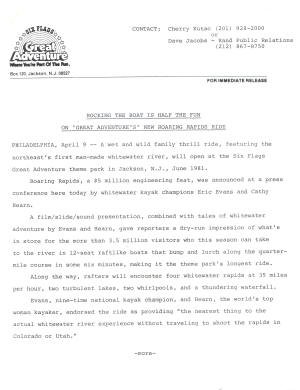

|
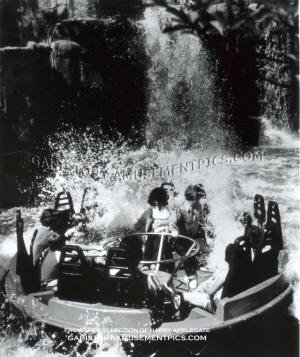 |
| |
|
 |
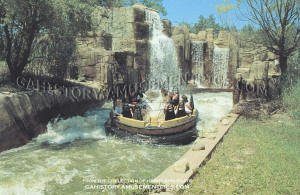 |
| |
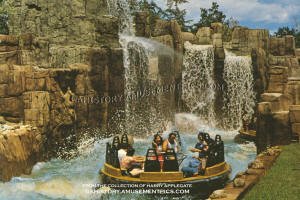 |
| |
|
|
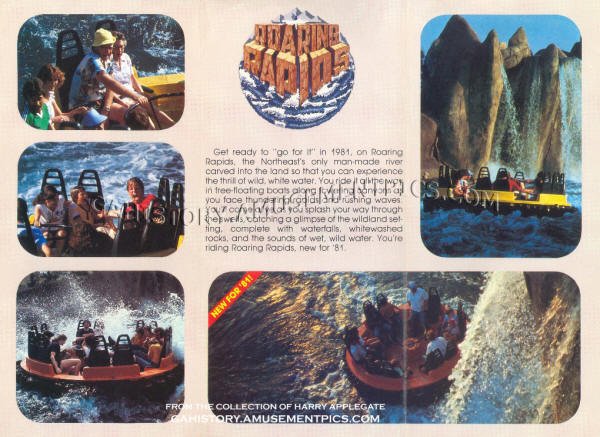
Roaring Rapids
Technical Information: |
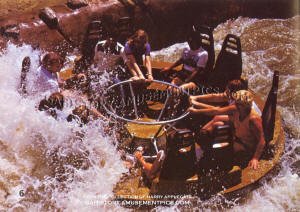 |
| |
 |
|
Manufacturer: |
Intamin AG
Zurich Switzerland |
|
Ride Model: |
Rapids Ride
12 |
|
Opening Date: |
June 1981 |
|
Planning Hours: |
2,400 hours |
|
Ride Acreage: |
5.5 acres |
|
Excavation: |
20,000
cubic yards of dirt removed |
|
Concrete: |
3,500 cubic
yards |
|
Concrete Coloring for Rock: |
32,000 lbs
of red/brown tone |
|
Landscape Work By: |
60 tons of
artificial rock
by Rock
and Water Scapes in Irvine, CA |
|
Length of Ride: |
4 to 6
minutes long at 3 to 5 mph, approximately 1/4 mile long or 1440
feet |
|
Rapids: |
Four sets
of rapids totaling 580 feet, longest set 270 feet |
|
Width of River: |
Varies from
15 to 50 feet |
|
Water Grade: |
12 feet
from start to finish |
|
Water Pumps: |
Two main
pumps of 450 horsepower each (pump 167,000 gallons per minute)
one 100 horsepower pit drain |
|
Number of Boats: |
20 boats |
|
Capacity of a Boat: |
12 riders |
|
Dimension of a Boat: |
12 feet
wide |
|
Ride Capacity: |
1,500
riders per hour |
|
Conceptual Design: |
Intamin AG
Zurich, Switzerland |
|
Structural Design: |
The
Birdsall Corp., South Belmar, NJ |
|
Special Effects: |
Two wave
makers driven by 25 horsepower motors |
|
|
Two
whirlpools created by 75 horsepower water pumps |
|
|
One
waterfall driven by a 30 horsepower water pump |
|
|
Four rapids
created by utility poles on bottom lining of sculptured concrete
"river bottom" |
|
Reservoir: |
Water
sourced through Great Adventure's own self contained water well
system located on the park property.
All water for the ride will be re-circulated. |
|
Capacity of Reservoir: |
1,500,000
gallons |
|
Dimensions of Reservoir: |
41,000
square feet
112' x 193'
wide |
|
Depth of Reservoir: |
10 foot 6
inches |
|
Boat Propulsion: |
Boats are
free-floating and propelled only by the force of the River |
|
Cost: |
$5 million |
|
|
 |
| |
 |
| |
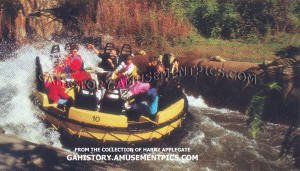 |
| |
|
|
 |
 |
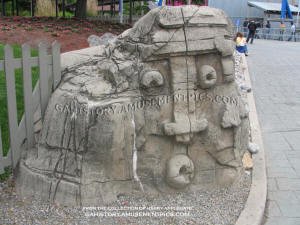 |
| |
|
|
 |
 |
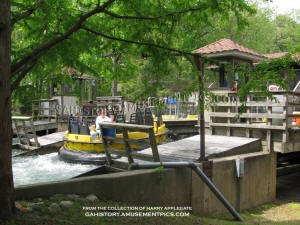 |
| |
|
|
 |
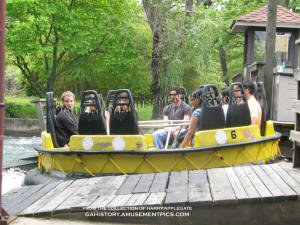 |
 |
| |
|
|
 |
 |
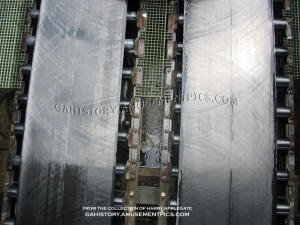 |
| |
 |
| |
|
|
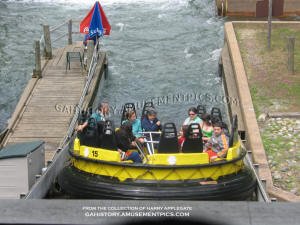 |
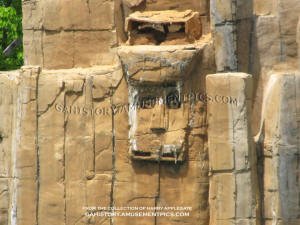 |
 |
| |
|
|
 |

Commercial Jingle:
It's wet and it's
wild,
Fun for every mother's child,
There's white water to the left of you,
White water to the right.
Around the bend,
And back again,
It's different every ride,
So come together, shoot the rapids,
On Great Adventure's Roarin' Rapids ride! |
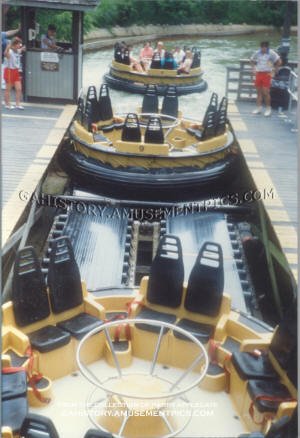 |
| |
|
|
 |
 |
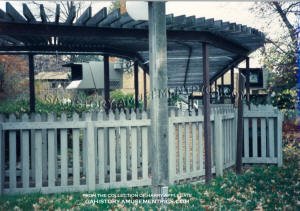 |
| |
|
|
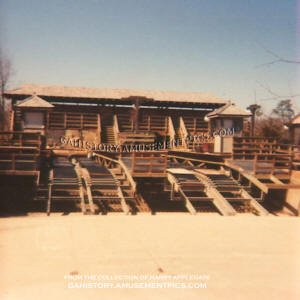 |
Roaring Rapids was constructed over the winter of
1980-81 and made its debut in June of 1981, as one of the world's first
river rapids rides.
The ride was built at the farthest end of the park, behind Lightnin'
Loops, in a previously undeveloped area of woods.
As part of the construction, a gift shop and snack bar were constructed
along the pathway.
The ride uses gravity to propel the boats along the course, with a 12
foot drop in elevation creating the current. Huge pumps at
the ride station pump the water from the low point at the end of the
course to the high point where the boats are launched.
Along the course of the ride there is a wave making machine on the first
leg, followed by a succession of rapids created by the fast currents in
the back section. Another wave machine sits in the back
corner of the ride where the current slows again, then starts a
succession of rapids as boats head toward the waterfalls in the front
corner. At the end of the course is the retention basin
which also serves as a corral which holds boats not in operation, as
well as holding the water when the pumps are not activated.
Boats are carried up to the high point of the ride at the station
platform with a series of conveyor belts. The station has
twin loading and unloading platforms, and the boats are directed to one
side or the other with a powerful water jet pushing them towards the
appropriate belt. Within the station the belts are
broken into blocks allowing multiple boats to be loaded and unloaded,
and advance onto the river as they are ready to dispatch.
The ride requires a fairly large staff, with multiple attendants in the
station as well as operators overseeing the loading/unloading and
advancing of boats through the station positions. In
addition, attendants are positioned along the ride route, monitoring the
progress of boats and occasionally eliminating boat jams. |
 |
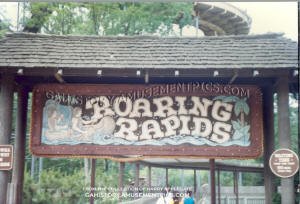 |
 |
| |
|
 |
 |
| |
|
 |
 |
| |
|
 |
 |
| |
|
 |
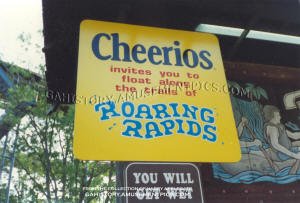 |
| |
|
|
 |
 |
| |
|
|
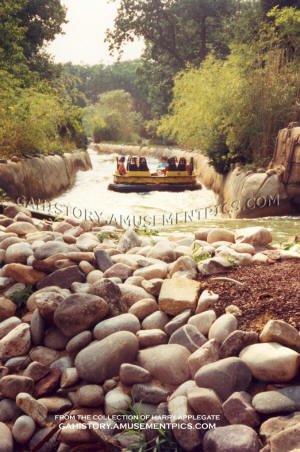 |
 |
 |
| |
|
|
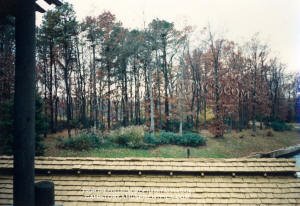 |
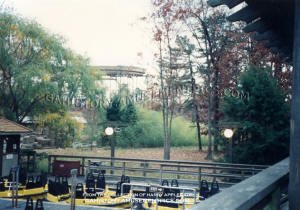 |
 |
| |
|
|
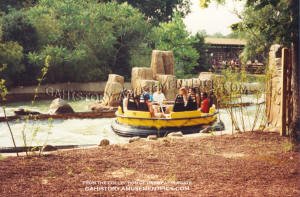 |
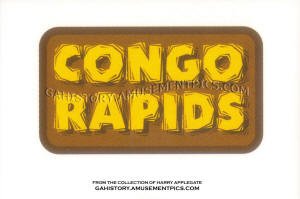 |
 |
| |
|
|
 |
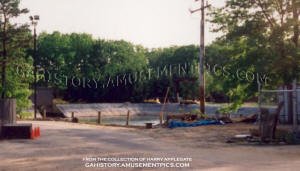 |
 |
| |
|
|
 |
Roaring Rapids has had several modifications over
the years beginning with the first off-season. Plans were
made to make the ride wetter:
An excerpt from
the article
Some Great Adventure Plans Are All Wet
published in The Press,
Atlantic City
dated January 30, 1982.
Some (changes for
the upcoming season) involve the $3.6 million Roaring Rapids ride that
opened last June.
It seems that the park’s latest water ride
had one specific fault:
It failed to get everyone wet.
(Park spokesman Robert) Williams said park
officials found that patrons usually got in line for Roaring Rapids to
get a break from the hot summer sun.
But often the doughnut-like rafts, which
drift for about five minutes over artificial rapids and past a
waterfall, didn’t splash enough riders.
Many who failed to get wet came off the
ride disappointed, according to Williams.
Well that’s going
to be changed.
“This year, we intend to get everybody in
the boat wet,” Williams said.
Improvements
slated for Roaring Rapids include adding a few geysers with one
concealed in a dark tunnel that will insure everyone gets soaked,
Williams said.
He said the park will spend a few hundred
thousand dollars on Roaring Rapids alone.
In 1988 more changes were made to improve ride safety, with
the addition of the attendant block advance buttons on the docks and
life rings along the river. Walls
of pressure treated lumber added a few years later to prevent boats getting caught
between the rocks. The wave machines were deactivated as
well since they were rendered useless by the new walls.
|
 |
| |
|
 |
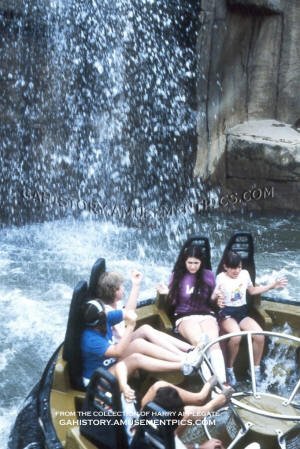 |
| |
|
 |
 |
| |
|
|
 |
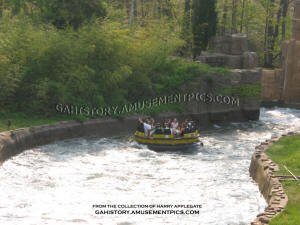 |
 |
| |
|
|
 |
 |
 |
| |
|
|
 |
 |
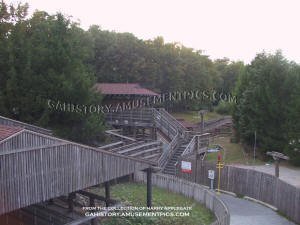 |
| |
|
|
 |
 |
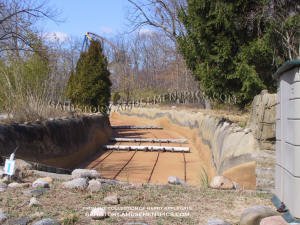 |
| |
|
|
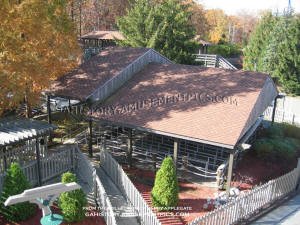 |
 |
 |
| |
|
|
 |
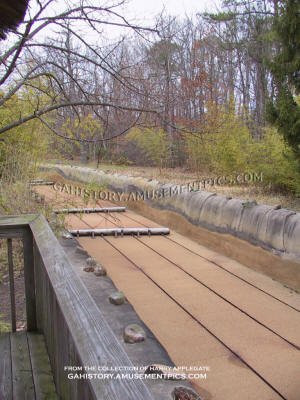 |
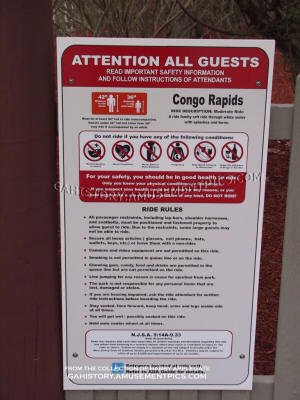 |
| |
|
|
 |
Over the years,
Roaring Rapids was renamed Congo Rapids when it became part of the
park's Adventure Rivers area.
The ride has had a long list of sponsors over the years including:
Ramblin' Rootbeer
Sunoco
Tide
Cheerios
& TWA Airlines
Part of the design of the ride includes steel tracks at the bottom of
the trough that the logs which create the rapids along the course of the
river are attached to. The tracks allow the logs to be adjusted to
create variations in the current if necessary.
A later addition to the ride was a set of water jets which could be coin
operated and offered another opportunity for riders to get wet.
The water jets were located next to the ride viewing platform built as
part of the Adventure Rivers expansion as the neighboring Koala Kanyon
was built.
Another of the ride features which many guests got VERY familiar with
was the queue which features a long and winding path covered with a
pergola for shade. The original queue proved inadequate for
the crowds the ride drew, with lines often extending as far as the
Lightnin' Loops Cafe. For the second season the large queue house
was constructed near the station.
Lighting for the ride has been upgraded over the years with the original
large white globe fixtures being replaced with ruffled metal shades. |
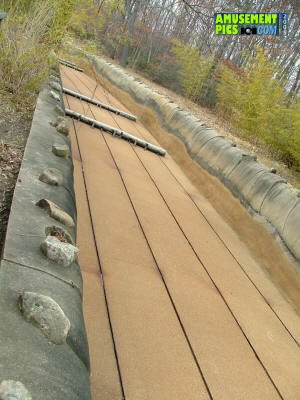 |
| |
|
 |
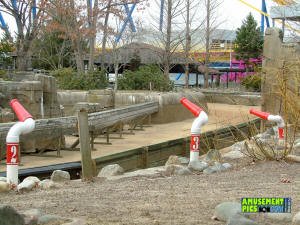 |
| |
|
 |
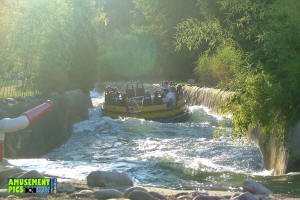 |
| |
|
 |
 |
| |
|
|
 |
 |
 |
| |
|
|
 |
Watch
Roaring Rapids
In Action:

|
| |
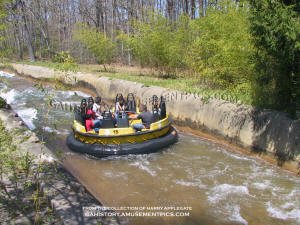 |
| |
 |
| |
|
|
 |
Top right, the Roaring Rapids crew always stood
out in the park, being the only ride to have its own special uniform.
Pictured here in the park employee newspaper The Good Ol' Summer
Times, you can see the Safari style shirts.
The uniforms also had matching pith helmets. The Rapids crew
was always looked on as the "cool" crew in the park since the guys were
the only males in the park allowed to wear shorts at the time.
To the right you can see the lush landscaping of the queue from the
platform of Lightnin' Loops.
Lower left is the rendering of Roaring Rapids from the 1981 poster map.
Lower right is the face that greets guests as they enter the ride queue.
Below are some of the most popular souvenirs sold at the Roaring Rapids
Gift Shop which included a boat shaped ashtray, a paddle, and a pennant.
Both the ashtray and pennant feature park logos inherited from the
original Thunder River at Astroworld, which had the trail of stars logo
under Six Flags ownership.
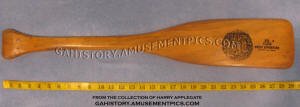 |
 |
| |
|
 |
 |
| |
|
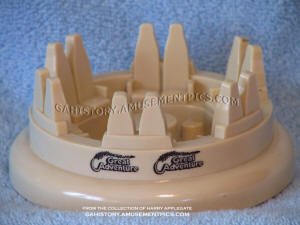 |
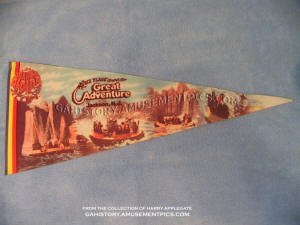 |
| |
|
|




